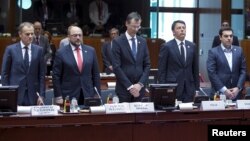The European Union, under mounting pressure to ease a surging migrant crisis, has agreed to triple funding for maritime search and rescue operations in the Mediterranean.
German Chancellor Angela Merkel announced the pledge Thursday after an emergency EU summit in Brussels. Additionally, French President Francois Hollande said he will seek a United Nations resolution authorizing the EU to destroy boats used by people smugglers to ferry thousands of migrants from North Africa to Europe.
At a news conference after Thursday’s summit, President of the European Council, Donald Tusk of Poland, which holds the rotating European Union presidency, said Europe did not cause a tragedy that has seen hundreds of illegal migrants die at sea this year.
“But that doesn’t mean we can be indifferent," he said. "We are facing a difficult summer and we need to be ready to act.”
Tusk said EU leaders also agreed to curb illegal migration, protect refugees and encourage relocation of migrants from so-called frontline countries such as Italy to other EU countries on a voluntary basis.
The EU has been sharply criticized for not doing enough to address the Mediterranean migration crisis. Even before the summit ended, the rights group Amnesty International criticized the measures being discussed as "woefully inadequate."
Even European Commission President Jean-Claude Juncker expressed disappointment with the results, saying he had hoped the outcome would be more ambitious.
Victims of capsized ship laid to rest
The EU summit came just four days after up to 900 migrants aboard a single boat bound for Italy drowned off the coast of Libya, when the vessel capsized. It was Europe's worst migrant disaster.
Britain, Germany, Belgium and Ireland all said Thursday they would contribute ships to the new EU maritime operations. British Prime Minister David Cameron, facing anti-immigration populists in an upcoming election, earlier promised a helicopter carrier and two other vessels to rescue operations he had previously opposed.
But he said those rescued at sea will not automatically be granted refuge in Britain, and would most likely be delivered to Italy, where severely overcrowded migrant camps abound.
About 150,000 migrants reached Italy last year. Rome said Wednesday that 5,000 could reach its shores each week over the next five months — as many as 200,000 by the end of the year. The death toll from the migrant crossings has surged to about 1,800 this year, compared to 100 at the same point in 2014.
Since the defunding of a 2014 EU migrant rescue program, Italy has shouldered most of the burden of rescuing migrants at sea because of its geographical proximity to Libya. Analysts uniformly predict the number of drowning deaths will continue to rise unless rescue efforts are either increased or the flow of migrants severely curbed.
Meanwhile, European authorities continue to investigate how the migrant boat capsized on Sunday. Italian prosecutors say the ship's Tunisian captain, who has been arrested, mistakenly steered his boat into the Portuguese merchant ship.
European officials have voiced their sympathy at the loss of lives in the latest migrant capsize disaster. But some have said the answer to the crisis is not a more accommodating immigration policy, but better armed patrols to keep migrant boats from leaving Africa for the Mediterranean crossing to Europe.
Experts say broader issues, like poverty and conflict in migrants’ home countries, also must be addressed.





